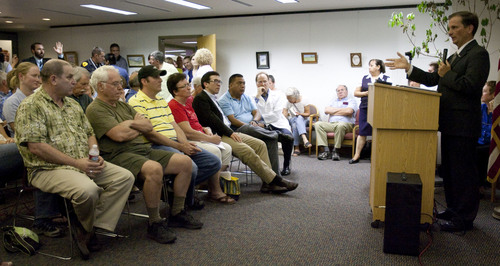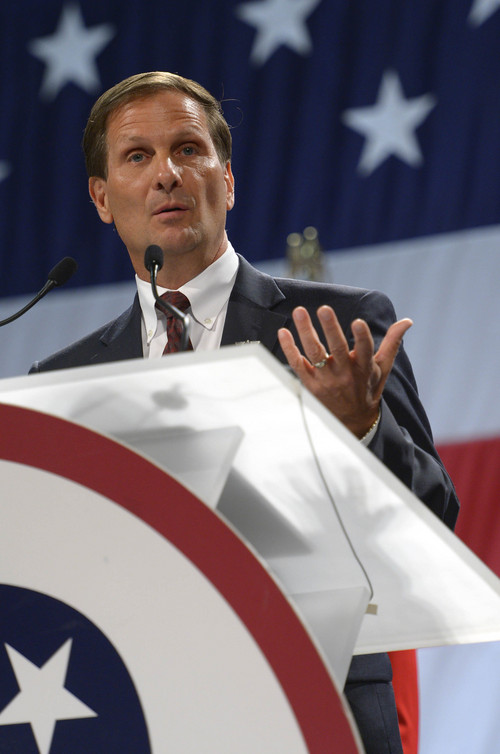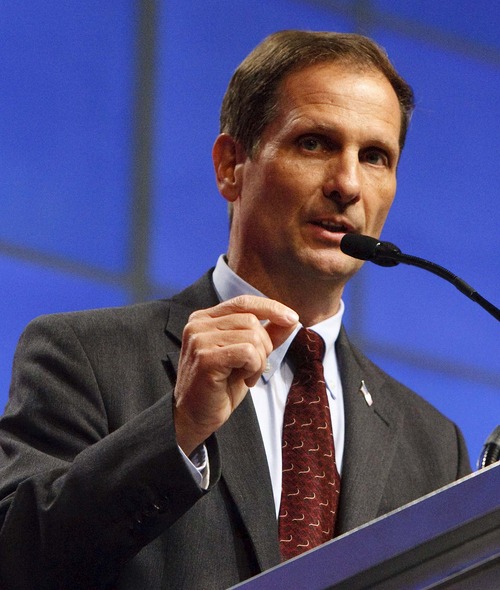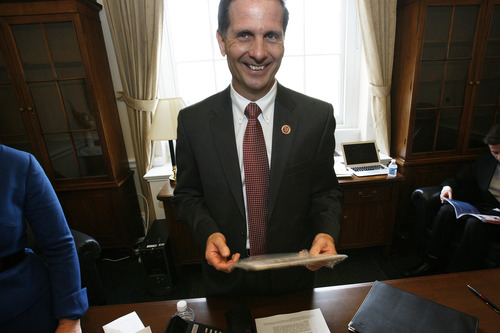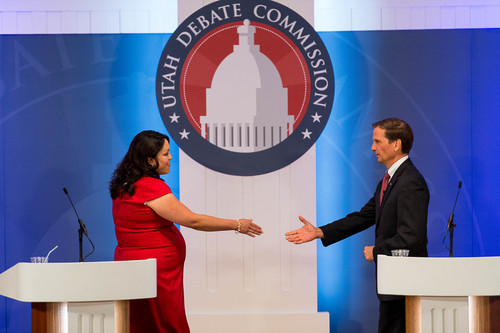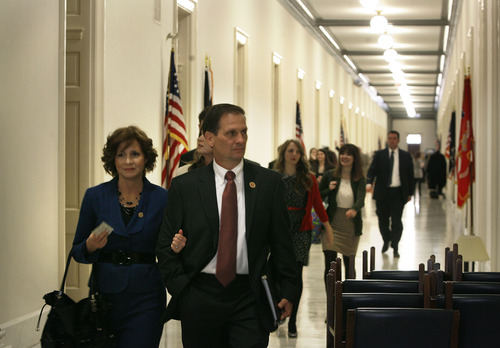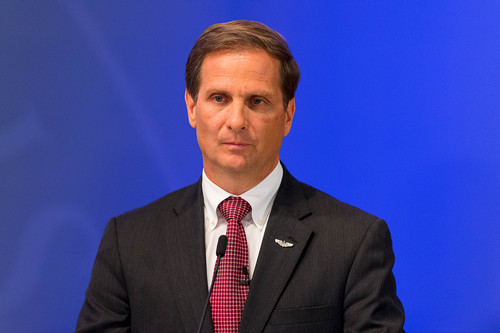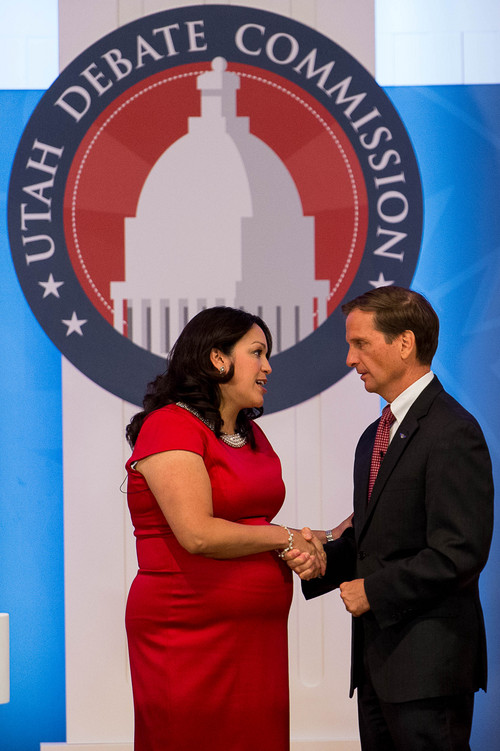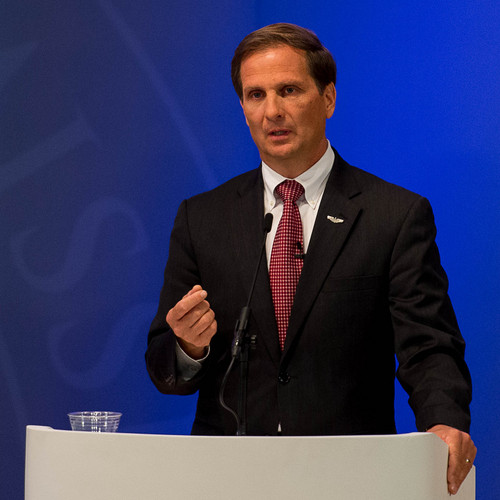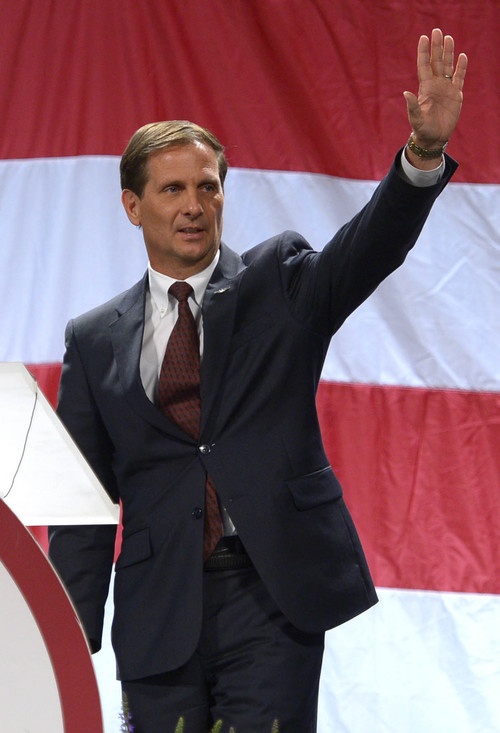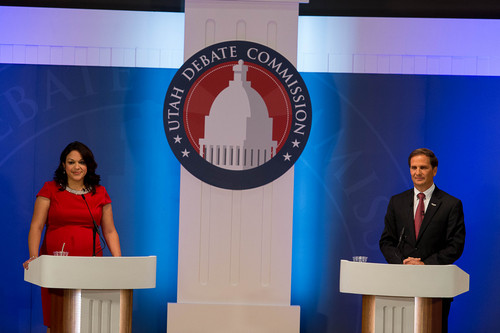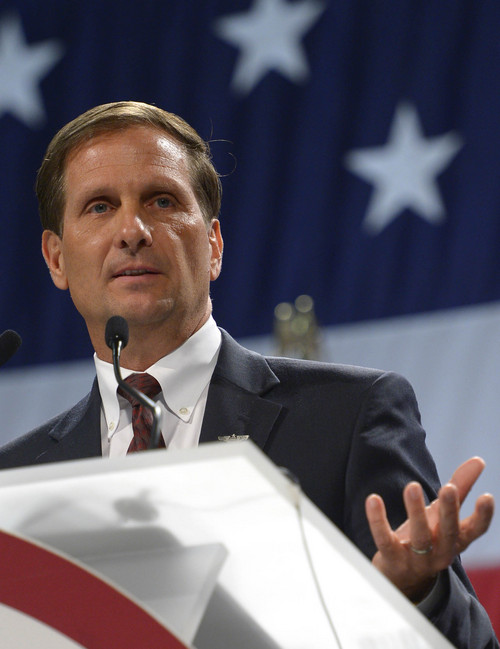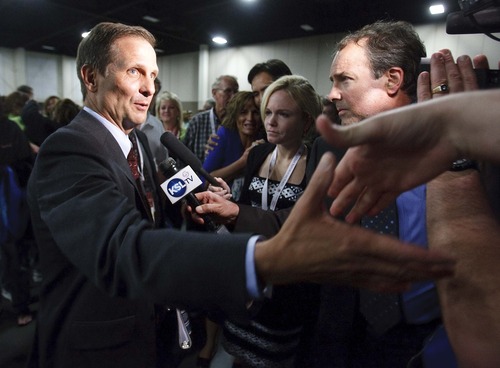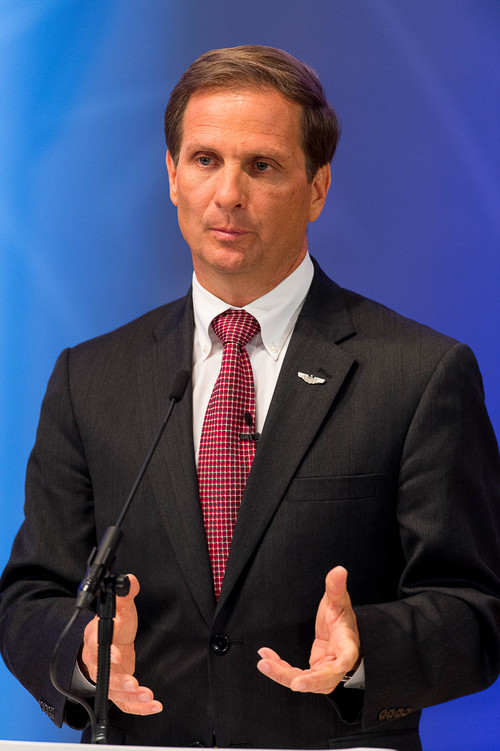This is an archived article that was published on sltrib.com in 2014, and information in the article may be outdated. It is provided only for personal research purposes and may not be reprinted.
Washington • After a week of votes, Rep. Chris Stewart shuttled to Reagan National Airport and boarded a direct flight to Salt Lake City. The freshman congressman from Utah grabbed his coach seat and glanced out the window.
And he winced.
"What have we done," Stewart recalls thinking at the time. "What have we done this week? What have we done in a year?"
Stewart came to Washington in 2013 as Utah's newest congressman, but he joined a dysfunctional system, one that yielded a government shutdown and a Congress so divided that it could barely pass temporary budget bills, let alone meaningful reform.
It was discouraging, he acknowledges, and on the plane that day he questioned whether he wanted to spend the next several years treading water.
"I tell people all the time, if you're frustrated with Congress, I promise you, you're not more frustrated than I am," Stewart explains while sitting in his office across the street from the Capitol, his former Air Force pilot helmet behind him and pictures of the jets he flew adorning the wall.
"I didn't run for Congress because it's been my lifelong dream to be a congressman, to spend my life in Washington, D.C. I came from a background where I'm used to doing things and there weren't these institutional roadblocks to accomplish anything. I wasn't used to that."
Nearly two years into his term, Stewart says he finally has found his vibe — and a reason to keep plugging away on Capitol Hill. Idealistic, big-picture changes are fine to shoot for, but they don't happen overnight, he says. It's best to focus on what you can do so he's seeking a second term.
"I realize it's the way our Founding Fathers set this up," the GOP congressman adds. "They expected this to be kind of a grind."
It has been for Stewart. Like many members, he hasn't passed a single bill.
—
The newbie • Stewart won the nomination for the 2nd Congressional District amid controversy at the 2012 Utah Republican Convention. Another contender alleged that four other hopefuls were secretly ganging up on Stewart to hurt his chances. Stewart won the party nod with fingers pointing and accusations flying.
The GOP later investigated and ruled out any conspiracy, concluding it was simply an unfortunate and uncoordinated decision by one candidate to hurl accusations from the podium without evidence to back them up.
So Stewart moved on, snaring 62 percent of the vote in the general election and jetting to Washington to pick out an office and find his bearings. The former Air Force major and best-selling novelist had never held elected office before and expected a steep learning curve.
He got it. It was, many warned, like drinking from a fire hose.
He also had to grapple with concerns from home-state critics. Democrats had questioned whether Stewart would align with "radical" House members, who sided more with the tea party than their own political party.
Stewart steered clear of the official House Tea Party Caucus. He nabbed chairmanship of a science subcommittee on the environment, and his first in-office controversy emerged when he questioned how much of climate change was man-made. He said the science on the issue isn't firm and needs more study.
It's now a debate he would rather downplay.
"If you want to sit down and talk about the science of this thing, I've got my statistics and other people have theirs, but at the end of the day, all you do is walk away mad," he explained, opting instead to focus on what can be done, how to create a global consensus and how much it will cost.
It's not his cause, and a new opportunity shifted his focus.
In December 2013, then-Majority Leader Eric Cantor, R-Va., and Majority Whip Kevin McCarthy, R-Calif., approached him about joining the Appropriations Committee. It was rare for a freshman to join the powerful panel.
House Speaker John Boehner says Stewart's knack for being a hardworking team player earned him the spot.
"Chris distinguished himself early on, and the entire leadership team took notice," the Ohio Republican said in a statement. "He came to the House ready to work and help our country move forward. His work ethic, expertise and bipartisan demeanor were all big reasons he gained a subcommittee chairmanship and a spot on the House Appropriations Committee."
Utah hadn't had a member of the House Appropriations Committee since 1981, and even though Congress hasn't produced a budget — it continues to pass stopgap bills instead of a whole spending plan — Stewart notes that his committee approved 11 of the 12 individual department funding measures last year.
Though the Senate never passed it, the Interior Department's appropriations bill contained language Stewart included to place a one-year moratorium on listing the sage grouse as an endangered species. He's optimistic regular congressional budgeting will return next year.
"I hope the process opens up and becomes functional again."
—
The non-Chaffetz • Stewart's Washington office lies two floors above Utah colleague, 1st District GOP Rep. Rob Bishop, who is in line to take over the House Natural Resources Committee and is a strong critic of federal control of public lands.
Stewart represents the 2nd District — which Rep. Jim Matheson, a conservative-to-moderate Utah Democrat, held for 12 years before redistricting prompted him to jump to the 4th District.
On a recent Wednesday, Rep. Jason Chaffetz, the Republican for Utah's 3rd District, was all over the TV in Stewart's lobby. While Stewart says he shares some of the qualities of his Beehive State colleagues, he's not trying to imitate them or play their roles.
"I'll probably never be like Jason" with the media, he says, "because Jason is really good at that."
Stewart says he instead zeroes in on national-security issues, given his military background, and calls himself a mainstream conservative, at home in the Republican Study Committee and not on the more extreme ends of the political spectrum.
"Ted Cruz [a Republican senator from Texas] doesn't call me and invite me to dinner but neither does Sheila Jackson Lee," Stewart says, referencing the more liberal Democratic congresswoman from the Lone Star State.
Stewart did band with his fellow Republicans last year in their plan to tie funding cuts for the Affordable Care Act to passing a budget, a move that led to the government shutdown.
He doesn't regret the vote.
"What has caused more disappointment and harm to our country? The 16 days that we were shut down or the implementation of Obamacare since?" Stewart asks. "I think it's unquestionably the second."
Utah Democratic Party Executive Director Matt Lyon says Stewart has pushed that GOP message on Obamacare and other issues more than he's worked to represent his own constituents. The first-term congressman, Lyon says, wants Utah to take control of public lands when the state's tourism industry pours $7.6 billion into the economy every year.
"I don't think he's done or accomplished much," Lyon adds. "He seems to be a cog in the normal Republican machine with the standard talking points, denying science, blatant and straightforward facts, and regurgitating what GOP leadership says to do. ... We should expect more of our elected officials."
For his part, Stewart is proud of the bills he's introduced: one to prevent a new national monument in Utah, another to slash funding for any SWAT-like teams in federal regulatory agencies, and yet another to allow states and American Indian tribes to manage wild-horse populations.
He also points to his more than 30 town halls, his contact with 500 constituents who have reached out to him and personally meeting with some 5,000 folks from his district, which includes most of Salt Lake City as well as rural areas in western Utah.
Salt Lake City Mayor Ralph Becker, who has endorsed Stewart's Democratic rival, state Sen. Luz Robles, says the congressman has been accessible and willing to listen — even on issues in which they differ.
"I don't think there's been a time when I needed him, where he hasn't been responsive," Becker says, noting meetings in Washington and in Utah. "He's genuinely trying to do his job."
Stewart says he now realizes he can find satisfaction in smaller victories even as he aims for bigger changes.
He doesn't want to stay in Washington to spout talking points, he says, but intends to work to earn the respect of his colleagues so he can help Utah and the country.
"I'm a serious legislator," he says — with no trace of a wince.
Published Monday
A look at the legislative record of state Sen. Luz Robles, D-Salt Lake City. That story also is available at sltrib.com.


